Christie Elan-Cane is challenging the UK government to introduce ‘X’ passports. | Photo: CreativeCommons | Supplied
A non-gendered campaigner in the UK just lost a fight to have a passport listed with ‘X’ instead of male or female.
Christie Elan-Cane doesn’t identify with any gender and uses the pronoun ‘per.’ Elan-Cane and her legal team are now considering an appeal.
It’s a fight Elan-Cane has been pursuing for the past 25 years.
At a hearing delivered at Nottingham Crown Court today (22 June), Mr Justice Jeremy Baker ruled that HM Government’s refusal to issue non gender-specific ‘X’ Passports to citizens who define as neither male nor female is not unlawful.
The judge observed the Claimant’s rights under ECHR Article 8 [Right to respect for private and family life] were triggered in this case.
He said: ‘I am satisfied that the claimant’s Article 8 rights are engaged in this case so that the claimant’s right to respect for private life will include a right to respect for the claimant’s identification as non-gendered.’

Christie Elan-Cane has been fighting for non-gender specific people’s rights for 25 years | Photo: Gay Star News
Elan-Cane said in a statement: ‘I am bitterly disappointed that my case for the judicial review of the UK Government’s discriminatory passport policy was not upheld.
‘Not just for myself but for everyone,’ per said.
The UK government is currently reviewing the policy. As some consolation, Justice Baker said Elan-Cane will be able to ‘scrutinise’ the review.
Elan-Cane responded: ‘I trust there will be no repeat of the false assurances that led to a sham passport policy review just a few years ago.
‘I have justifiable reason to doubt the sincerity and the motivation behind this Government proposal,’ per said.
‘X passports are a crucial step’
Clifford Chance – the law firm representing Christie’s case pro-bono – considers the case to be of ‘significant public interest.’
‘Gender identity is a fundamental part of an individual’s intimate, personal identity and X-passports are a crucial step in the protection of the human rights of this group of individuals,’ Clifford Chance Partner Narind Singh tells Gay Star News.
[embedded content]
‘We are considering with Christie the possibility of seeking leave to appeal’
Responding to today’s judgement, a Clifford Chance spokesperson said, ‘We are disappointed with the outcome in today’s judgment which leaves the UK, unlike many other countries, denying non-gendered citizens a passport that reflects their true identity.’
Last fall, Canada joined Australia, Denmark, Germany, Malta, New Zealand and Pakistan in offering an ‘X’ option on passports. India and Nepal also offer a variation on a third-option to ‘M’ and ‘F’.
‘However,’ the spokesperson went on to say, ‘we welcome the fact that the Court has ruled that the Government’s current review of gender markers in official documents and gender recognition will be required to be undertaken without any undue delay.
‘The Court has recognised that the Government must take into account shifts in attitudes towards diversity, inclusion, and equality.’
‘We are considering with Christie the possibility of seeking leave to appeal today’s judgment. We will continue to assist Christie in this fight. We welcome the Court’s ruling that Christie will be entitled to scrutinise the outcome of the review that the Government is undertaking, and we will continue to assist Christie to hold the Government to account.’
Blue passports will cost 240 times more than adding an ‘X’ option would cost
Earlier this year, the UK Home Office announced they will be changing the color on UK passports from burgundy to navy blue.
And the cost of the new contract announced earlier in the year will £480m ($670m, €565m).
Upon the news of the blue passports, Elan-Cane cried hypocrisy after the UK Home Office told per a £2million figure was the ‘prohibitively expensive’ reason they could not implement the call for ‘X’ non-gendered passports.

Left: Non-gendered activist Christie Elan-Cane / Right: Home secretary Amber Rudd
Spending money on a new passport contract, without including the X option – feels like just another lost opportunity in a 25-year history of setbacks:
‘The Government perceives the blue passport as symbolic to the national identity. What about the personal identity – and the integrity – of the passport holder?
‘I’m very angry that this ongoing battle with governing authorities has dominated my life. I just want to achieve legitimate identity that most other people can take for granted.’






